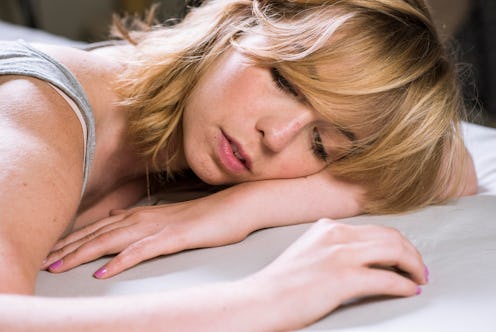
While you might be looking forward to being blessed with an extra hour of sunlight come Mar. 11, 2018, losing an hour of sleep is no joke. Daylight saving time 2018 seriously messes with your sleep, but experts have some hacks for ensuring you get up on the right side of the bed. First, let's establish that there's no getting around the fact that you're going to feel like a zombie for a few days. However, Colin Espie, co-founder of digital health company Big Health (makers of sleep-improvement program Sleepio) and Professor of Sleep Medicine at Oxford University, tells Bustle that your body will adjust in a few days.
If you think that losing an hour of sleep is no biggie, think again. "In general, 'losing' an hour in the spring is more difficult to adjust to than 'gaining' an hour in the fall," WedMD noted. While getting that extra hour of sunlight is pretty boss, this gift doesn't come without a price. What's more, WebMD cautioned that people who regularly get six or less hours of sleep a night will have a tougher time than those who get eight or nine hours. "In this situation, you may well experience the decrements of performance, concentration, and memory common to sleep-deprived individuals, as well as fatigue and daytime sleepiness."
Ugh. So, what's a sleepy head to do? Seriously, you might want to proactively book a half hour at a nap club for the day after spring forward. Unfortunately, there's no magic formula for getting through spring forward unscathed, but there are a few things you can do to make it a little less awful. "Get up at the same time after the clocks spring forward," Espie tells Bustle. "Maintaining a routine is key, even if you feel a bit more tired for the first few days following the time change."
While you're totally empowered to sleep an extra hour to make up for the one you're losing, that's really not what's best for your body. "Natural light is an important regulator of our body clock, so be sure to seek out exposure to morning light whenever possible to help you adjust naturally. Push yourself to get out of bed and start your day," Espie says. This may feel like a lot of prep for just an hour of sleep, but the Boston Globe reported that sleepiness as a result of daylight saving time can have adverse affects everything from driving to your health and more.
"Researchers have found it can be dangerous to mess with sleep schedules. Car accidents, strokes, and heart attacks spike in the days after the March time change," Ben Steverman wrote for the Globe. "It turns out that judges, sleep deprived by daylight saving, impose harsher sentences." In fact, this is one of the reasons that spring forward and fall back don't happen during the week, Mohammad M. Amin, MBBCH at the Stony Brook Medicine Sleep Disorders Center told Reader's Digest.
"Daylight saving time is scheduled on a weekend, and it's not by chance," said Amin."It does have consequences on human sleep and daytime alertness. There is a temporary imbalance in our intrinsic circadian timekeeping system caused by the de-synchronization of the abrupt change of desired sleep-wake times." Basically, the day after spring forward is an ideal time to stay inside and marathon Netflix — because experts say your level of impairment can be similar to being drunk.
"However, because you don't feel drunk after a poor night's sleep, this can give a false sense of confidence or safety. Drowsy driving is a much larger public health problem than drunk driving," Benjamin Smarr, National Institutes of Health Postdoctoral Fellow at UC Berkeley and Reverie sleep advisory board, told Reader's Digest. "Drive more cautiously and be extra nice as everyone adjusts, and remind yourself that the inconvenience is real — and biological." If you have a hard time being nice to people when you're crabby — this is me all day — this is just one more reason to stay home and practice hygge and lagom.
The spring forward struggle is real, and it's a perfect excuse to stay in and marathon Gilmore Girls where the coffee never runs out and Sookie, Lorelai, Jackson, and Michel sleep in the zucchini patch, as one does, when the vegetables need nighttime company.
Sure, it's a total pain in the ass, but there is a silver lining. "While the time change will make the mornings slightly darker, you can look forward to brighter evenings," Espie says. Yes, please! Hey, with a little common sense, and a lot of Netflix, you can get through this whole spring-forward debacle just fine.